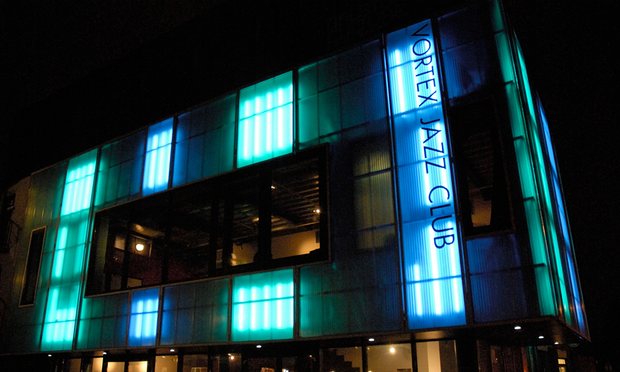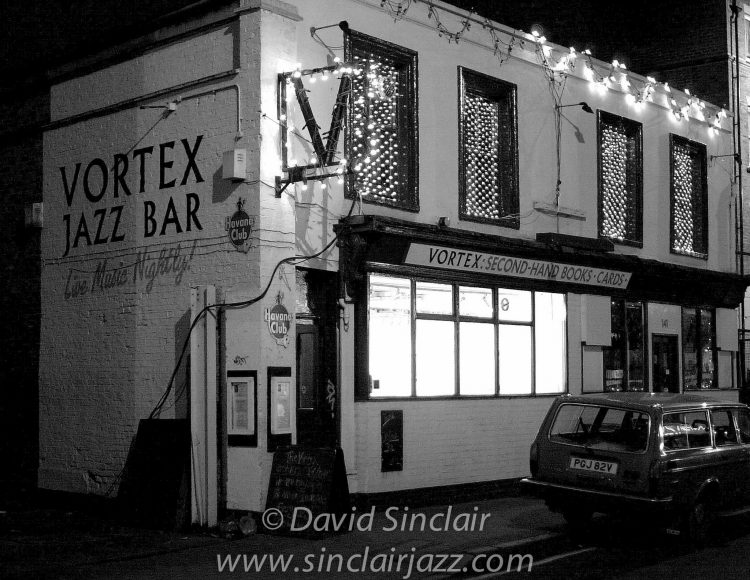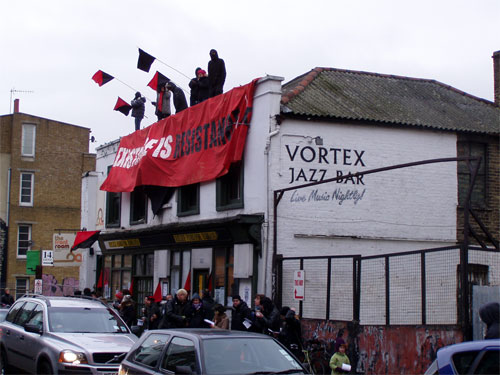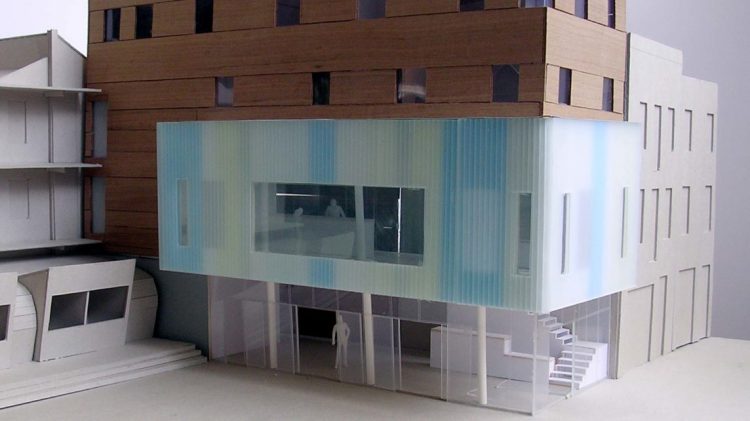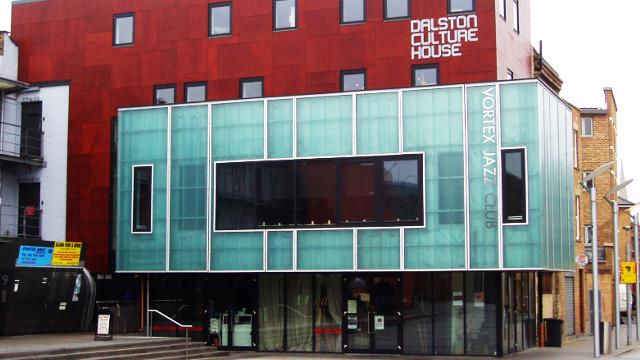The Vortex has been at the cutting edge of jazz for some time. “Jazz” in its widest sense. This is in part back to its history.
Vortex began over 30 years ago as the brainchild of former taxi driver David Mossman and his business partner Irving Kinnersley. Since its inception the club has served as a vital hub for the local artistic community and as a beacon for visiting artists from all over the UK and abroad. But in that time we’ve also come a long way and a lot has changed. When the Vortex first opened its doors in 1984 it was an art gallery on Church Street, Stoke Newington.
Not too long after, David and Irving decided to add a café downstairs providing a space for people to meet and exchange ideas, and to help with the costs of keeping the place running.
The Vortex Gallery went on to develop a bookshop and art supplies store and eventually in the mid-1980s we began hosting occasional jazz gigs in the space. By 1987 the music was proving more popular than the visual art, so David decided to re-launch as a live music venue. The upstairs of the Church Street building was converted into The Vortex Jazz Bar, and the cafe/bookshop business continued downstairs with the occasional jazz-related art exhibition.
It had been Irving Kinnersley who first suggested that Vortex put on live jazz, but by the late ‘80s Irving had adventured off into the world of bookselling, opening his own shop and leaving Vortex in the capable hands of his business partner. David, actually a taxi driving mountaineer who hadn’t been especially interested in jazz when Vortex Galleries first opened, quickly fell in love with the music and took over as the sole owner of the venue.
In the late ‘80s and early ‘90s Vortex established itself as an essential destination for contemporary music in London, noted for its community atmosphere and groundbreaking performances, with music every night of the week. David programmed all the music himself, with the exception of nights run by musicians or friends of Vortex. Evan Parker started a monthly night that continues to this day.
The top innovative musicians in London, such as Kenny Wheeler, John Taylor and Norma Winstone were regulars. In the early 1990s saxophonist Elton Dean (1954-2006) started Rumours, a weekly Avant-garde music night. This was just at the time that the Jazz Cafe moved from Newington Green to Camden, leaving a gap in the area. Immediately, all generations of musicians flocked to play there. At one end there were the icons of the scene, such as Alan Skidmore, Sarah Jazz Morris and Don Weller. But also the continuation of the Loose Tubes scene, including Django Bates, guitarist Billy Jenkins and more. At around the same time, Jazz Umbrella also started as another regular night to help promote young musicians, fostering talent such as Christine Tobin and Julian Siegel.
Programming at Vortex also diversified in the early ‘90s with the arrival of Pirate Jenny, a weekly night of opera, cabaret and song, featuring the works of composers such as Gilbert & Sullivan and Kurt Weill. When it came to programming music, David said the best nights would come from musicians who had projects they were really excited about. “These great musicians would come to me with ideas and I’d let them do anything they liked, and it was always brilliant . . . I’d tell them there was no money in it, but they’d say that was fine.” In 1996 Derek Drescher, who then worked as a producer at the BBC, began to record sessions at Vortex for the program Impressions on Radio 3. Such regular recording has gone on regularly since!
However, by 2000 there was trouble on the horizon. The lease for the building on Church Street was approaching expiry, and given the burgeoning competition for property in the increasingly fashionable area, it became apparent that Vortex might need to move to a new location. A large-scale new development, Ocean, was in the planning stages nearby at 270 Mare Street. The Ocean project proposed to build a vast new arts centre housing three live music venues, however the developers lacked the local community networks required by Arts Council funding application criteria. A marriage of Ocean and Vortex seemed like an ideal solution to secure a future for both organisations. In the discussions that followed Vortex was offered full-time usage of one of the three venue spaces and with the help of Vortex team the Ocean project managed to secure funding from the Arts Council. But differences between the two organisations led them to part ways and for the time being Vortex remained on Church Street.
The Vortex Jazz Foundation was set up in November 2001 to protect the Church Street venue, and the initial plan was to raise funds to purchase the building. Efforts included a comedy fundraiser in 2002, which included performances by prominent comedians like Stewart Lee, Jenny Eclair and Johnny Vegas. The fundraiser was held at the Union Chapel in nearby Islington. However, in the end the building was purchased by another buyer in what was perhaps a blessing in disguise, since in 2003 Vortex began discussions with Hackney Co-Operative Developments, who were seeking tenants for their new Dalston Culture House development.
The club took a one year hiatus while the Dalston location was being completed and in 2005 Vortex moved into its current location in Gillett Square where it has been at the heart of Dalston community and culture through the Gillett Square partnership.
The club enjoys the loyalty of musicians and audience alike and has been recognized for its innovation and atmosphere.The club was nominated as a venue of the year by the Parliamentary Jazz Appreciation Group in 2006 and 2007 and was winner of the Live Jazz Award in 2013. It is consistently selected as one of the top 150 jazz clubs in the world by Downbeat magazine, was short-listed by Music Week as one of the best live promoters of 2011 and voted into the top 10 London venues by readers of Time Out in 2012. A recent poll on the web site allabout.com ranked the venue number 8 in the world!
Vortex began a partnership with Hackney Co-Operative Developments (HCD) in 2006 aimed at revitalising Gillett Square through free cultural events aimed at engaging all parts of the community. The Gillett Square Partnership does not receive any regular funding for the cultural programme it provides in the Square each year. However, numerous other key partners have graciously helped fund or produce work in the space, including The Barbican, L.B. Hackney Culture and Regeneration, The Arts Council, West Hackney Parochial Fund, The Big Lottery, The London Development Agency and Universal Board Games. It is currently completing a project In The Changes, funded with the support of Paul Hamlyn Foundation.
As a not-for-profit organisation which receives no regular public funding, Vortex relies on the hard work and dedication of its volunteers, many of whom are musicians themselves, who staff the club every night at the door, behind the bar, or in a technical capacity. Vortex is fortunate to have an audience whose loyalty has been proven time and time again and is grateful for the enthusiasm of its volunteers, without whom the club would not run, and the fervent passion of its musicians, which maintains its reputation as both a community institution and a world class music venue.
And so we are now looked at as a ‘go to’ venue for imaginative projects. The Vortex’s own record label’s first release, by Portico Quartet, was Mercury Prize nominated. Sons of Kemet did some of its first gigs at the Vortex.
